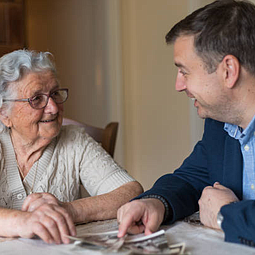Aging Wire: Health News of the Year
January 2, 2014 at 4:00 a.m.
Northwest Prime Time highlights a few of the headlines on aging, senior health, and gerontology that broke in 2013 as reported by Newswise, a resource that disseminates research findings on aging, health, science and other news.
• Statin use: New cholesterol guidelines for identifying adults at risk for heart disease represent the biggest change in such expert advice in more than 25 years, according to Loyola University Health System preventive cardiology experts.“This is very big news,” said Binh An P. Phan, MD, director of Loyola’s Preventive Cardiology and Lipid Program. “These new guidelines could dramatically affect how cholesterol is treated.” Under the guidelines, patients generally would be put on a cholesterol-reducing statin medication based on a formula that estimates their risk for cardiovascular disease rather than previous guidelines that placed more emphasis on patients’ cholesterol numbers. The clinical practice guidelines were issued by the American College of Cardiology and American Heart Association and are intended to better identify adults who may be at risk for cardiovascular disease and who thus may benefit from lifestyle changes or statin cholesterol medications. However, the guidelines are controversial and have not been endorsed by the National Lipid Association. Other research indicates that statins are being overprescribed. A new analysis concludes that large numbers of patients in advanced stages of kidney disease are inappropriately being prescribed statins to lower their cholesterol – drugs that offer them no benefit and may increase other health risks such as diabetes, dementia or muscle pain. The findings, which were published in the American Journal of Cardiovascular Drugs as a review of multiple studies, raise serious questions about the value of cholesterol-lowering therapies in kidney disease. The issue is important, the researchers say, because the incidence of chronic kidney disease is rising in the United States at what they called “an alarming rate.” Also, kidney disease patients are 23 times more likely to get cardiovascular disease, and for them it’s the leading cause of death. “I believe the evidence shows that the majority of people with chronic kidney disease are taking statins inappropriately,” a researcher said. “More drugs are not always better.” Some of the particular risks posed by statin use, especially at higher doses, include severe muscle pain, an increase in dementia and a significant increase in the risk of developing diabetes. If statins are prescribed in early-stage kidney disease, rather than late-stage disease, the study concluded that low dosages are more appropriate. Collaborators on this report include researchers from the Oregon Health and Science University and the University of Illinois at Chicago.
• Distinguishing between normal and more serious memory loss: Cornell University researchers developed a reliable method to distinguish memory declines associated with healthy aging from the more-serious memory disorders years before obvious symptoms emerge. The method allows research to accurately predict who is more likely to develop cognitive impairment without expensive tests or invasive procedures. Their results hold promise for detecting cognitive impairment early and monitoring treatment, but also have implications for healthy adults. “With 10 or 15 minute recall tests already in common use worldwide, we can distinguish individuals who have or are at risk for developing cognitive impairment from healthy adults, and we can do so with better accuracy than any existing tools,” said the lead researcher. The study also reported that the notion that memory declines continuously throughout adulthood appears to be incorrect. The research, “Dual-retrieval models and neurocognitive impairment,” appears online in the Journal of Experimental Psychology: Learning, Memory and Cognition, Aug. 26, 2013.
• Reducing the number of older patients readmitted to hospitals: As reported in the September issue of the journal Health Affairs, nearly one in five older adults who have common operations will end up in the emergency department within a month of their hospital stay, a new study finds – a surprisingly high number found in the first national look at the issue. There is a wide variation between hospitals in keeping their older surgery patients from needing emergency care after surgery: some hospitals had four times the rate of post-surgery emergency care for their patients, compared with others. The new findings come from an analysis of Medicare data from nearly 2.4 million adults who had at least one of six common operations in a three-year period (including angioplasty or other minimally invasive heart procedures, coronary artery bypass, hip fracture repair, back surgery, elective abdominal aortic aneurysm repair, and colectomy or removal of part of the colon, such as for colon cancer). More than half of the patients who sought emergency care ended up being readmitted to the hospital. Since Medicare now pays hospitals less if they have high readmission rates, and reports those rates publicly, health teams nationwide have ramped up their efforts to make sure hospital patients get support that will keep them from coming back in the “revolving door.” The new study suggests those teams should focus on ways to keep surgery patients from experiencing emergencies after they go home. The patients to the emergency room were cardiovascular and respiratory conditions, infections, complications with the site of their surgery or procedure incision, and abdominal or gastrointestinal problems. An important outcome may be that hospitals provide better transition care from the hospital to home and coordinating care across departments and settings, including outpatient care. More research is needed, including the role of social and family support.
• A transformation in the treatment of patients with dementia is quietly taking place. The Center for Innovative Care in Aging is collaborating with researchers at the John Hopkins School of Nursing (JHUSON) for this new program and clinicians are putting into practice a protocol that can ease the most troublesome symptoms of dementia, not through drugs but with behavior therapy. The Tailored Activity Program, called T.A.P. for short, is a research effort that treats dementia’s symptoms—of which agitation is the most disabling and frequently occurring—without medication. Under the program, activities are designed to match the patient’s interests and cognitive and physical abilities to help keep the person meaningfully engaged. The research is suggesting that this can minimize or prevent agitation. In the study, certified nursing assistants and recreational therapists were trained to use the tailored activities. The next step is to help the nursing staff use non-drug strategies as part of routine care on the unit.
• Community Aging in Place—Advancing Better Living for Elders (CAPABLE) is a community outreach research project involving an occupational therapist, nurse, and home repair team that provides low-income older adults with resources to help them age safely in their homes. Often, something as simple and inexpensive as lowered shelves or a more secure banister can make the difference in a person being able to stay at home or having to relocate. The success of CAPABLE has earned the attention of national media. “Very small changes can make a big difference.” The project focuses on function – what do the seniors need and want to do – rather than health factors such as high blood pressure.
For more information about Newswise, visit www.newswise.com





